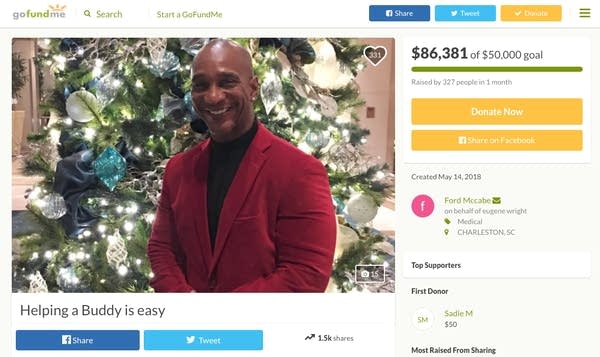Go fund my doctor bills: Americans ask for help paying for health care

Go Deeper.
Create an account or log in to save stories.
Like this?
Thanks for liking this story! We have added it to a list of your favorite stories.
Tammy Fox wanted to help after a friend took ill with a rare and difficult-to-diagnosis autoimmune disorder that required many trips to the Mayo Clinic.
While she couldn't do anything medically, Fox knew there was a way to ease some of the burden of medical bills and costs associated with doctor visits. She turned to the internet website GoFundMe.
"You've got meals, you've got hotel stays and, like I said, gas so that all needed to be covered," said Fox, who lives in suburban Minneapolis.
Contributions have come in from strangers, she noted. "It's crazy cool how awesome people are and what they're willing to give. People, when they come together, can just move mountains and I think that's awesome to see."
Turn Up Your Support
MPR News helps you turn down the noise and build shared understanding. Turn up your support for this public resource and keep trusted journalism accessible to all.
GoFundMe, the largest online, crowdsourced fundraising platform, says people have raised more than $5 billion from 50 million donations in the eight years since it began.
It's become a go-to way for people in need to help pay their doctors. Medical fundraisers now account for 1 in 3 of the website's campaigns, and they bring in more money than any other GoFundMe category, said GoFundMe CEO Rob Solomon.
"In the old paradigm you would give $20 to somebody who needed help," Solomon said. "In the new paradigm, you'll give $20, you'll share that and that could turn into 10, 20, 50 or 100 people doing that. So, the $20 could turn in hundreds, if not thousands, of dollars."
Stories of tragic illness and financial hardship — all of them with pictures of those suffering — are easy to find in GoFundMe's medical section.

There's a 3-year-old from Ft. Lauderdale, Fla., with a genetic disorder that makes him susceptible to bone breaks, which happened recently as his mom put him in a car seat. His relatives have raised more than $30,000 of their $40,000 goal.
A Charleston, S.C., man with prostate cancer and no health insurance asks for help as bills pile up. He sought $50,000; he's collected more than $85,000. A North Carolina woman who plays the harp and lost nearly all her hearing after a traumatic brain injury has almost raised the money she needs for procedures her insurance won't cover.
Americans' confidence that they can afford health care is slipping and rising co-pays and deductibles have left many with health insurance they can't afford to use, said Sara Collins, an economist who studies American health care concerns at the Commonwealth Fund.
The organization recently surveyed working-age Americans asking whether they could pay an unexpected medical bill of $1,000 in 30 days. Nearly half said no.
"We find that underinsured people are nearly as likely to report problems paying their medical bills as people who don't have any insurance and they also report not getting needed health care at rates that are nearly as high as those who are uninsured," she said. "So, it shouldn't be surprising that people are raising funds through crowdsourcing. But it really should be a deep concern for policy makers and providers."


